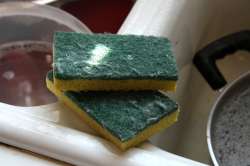Viruses found in kitchen sponges may eat bacteria: Study
A kitchen sponge is exposed to all kinds of different microbes, thus forming a vast microbiome of bacteria and providing rich food sources for phages.

The US researchers have discovered viruses that can infect bacteria in kitchen sponges, which may prove useful in fighting bacteria that cannot be killed by antibiotics alone. The study presented on Sunday at American Society for Microbiology's annual meeting showed that two researchers used the bacteria as bait and identified two phages or bacteria-eating organisms, which could swallow bacteria from their own used kitchen sponges, the Xinhua news agency reported.
A kitchen sponge is exposed to all kinds of different microbes, thus forming a vast microbiome of bacteria and providing rich food sources for phages.
"Our study illustrates the value in searching any microbial environment that could harbor potentially useful phages," said Brianna Weiss, a life sciences student at New York Institute of Technology, in a statement.
The researchers swapped the two phages to see if they could infect the other person's isolated bacteria and they found the phages did kill the other's bacteria.
They compared the DNA of both isolated strains and discovered that they belong to a rod-shaped group of microbes commonly found in feces. Some of those microbes could cause infections in hospital settings.
Although the two bacterial strains are closely related, the researchers found chemical variations between them when performing biochemical testing, which revealed that those phages are not picky eaters.
"These differences are important in understanding the range of bacteria that a phage can infect, which is also key to determining its ability to treat specific antibiotic-resistant infections," said Weiss.